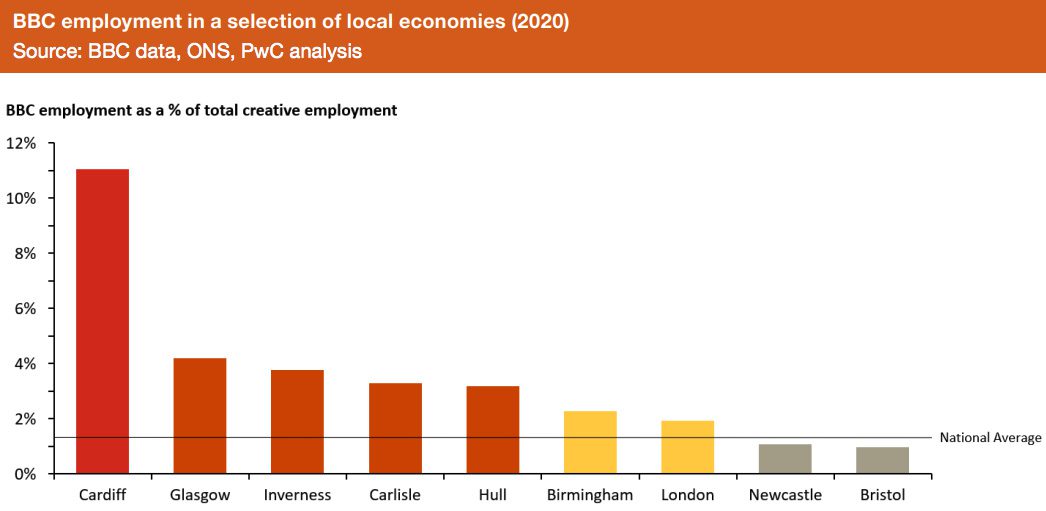A new report has shown how the BBC boosts the growth of creative industries across the UK. According to the study, has found that the broadcaster’s clusters in places like Glasgow and Cardiff contribute as much as 11% of the total creative employment in the area.
The British Broadcasting Corporation, known better as the BBC, is the national broadcaster of the United Kingdom, based at Broadcasting House in London, England. 2022 is a historic milestone for the historic organisation, marking 100 years since its first broadcast, in the autumn of 1922.
Now, research conducted by PwC has shown the continued impact the BBC has had on the surrounding media environment. A 15% increase in the BBC’s local operations doubles the rate of growth of the area’s creative clusters over time. This has been exhibited by creative hubs in Salford, Cardiff, Glasgow, Belfast and Birmingham – where BBC investment can be seen to have boosted the level of growth there, as a larger BBC presence amplifies the local creative economy.

BBC Director-General Tim Davie commented, “We’ve seen the significant impact the BBC has on creative economies regionally with greater growth, new creative businesses and more highly skilled jobs. We have delivered big moves for TV, radio and news content, better representing and reflecting audiences across the UK, and we are committed to doing more.”
Bristol is a key example of the process, according to PwC’s figures. The city’s BBC hub is home to its world-famous Natural History Unit – but despite the institution’s large presence there, BBC jobs only account for 1% of employment in the creative sector – below its national average of around 1.4%. This is because sustained investment in the regions builds talent pools, shared expertise and partnerships across the sector locally that encourages other businesses to locate and invest.
This has a knock-on impact of creating more creative businesses and more job opportunities with highly-skilled, higher-paid roles that deliver greater productivity. As a result, Bristol’s employment in the creative industries boomed by 74% between 2015 and 2020. Looking at this, the BBC’s plans to spend more outside of the UK capital suggest it will stimulate more of such growth across the country.

PwC’s study states that £700 million in additional spending from the BBC will take place outside of London by the 2027/28 financial year. This is expected to result in 4,750 new creative businesses and 45,000 additional jobs outside London.
Recently announced changes include moving hit show MasterChef to Birmingham from 2024, alongside a new Apprenticeship Training Hub in the city, and in the North East working in partnership with local authorities to invest at least £25 million in the region’s creative industries by 2027. This will help cultivate local networks, building creative supply chains and supporting new production companies through the BBC’s Small Indie Fund – which already supported 50 companies in the last year.
Nick Forrest, UK Economics Consulting Leader, PwC, said, “Our research shows the extent the BBC is an anchor institution, around which other creative sector businesses and workers tend to cluster. Without anchor institutions like the BBC pushing activity into the regions, the creative economy would likely remain unequally concentrated in London.”




